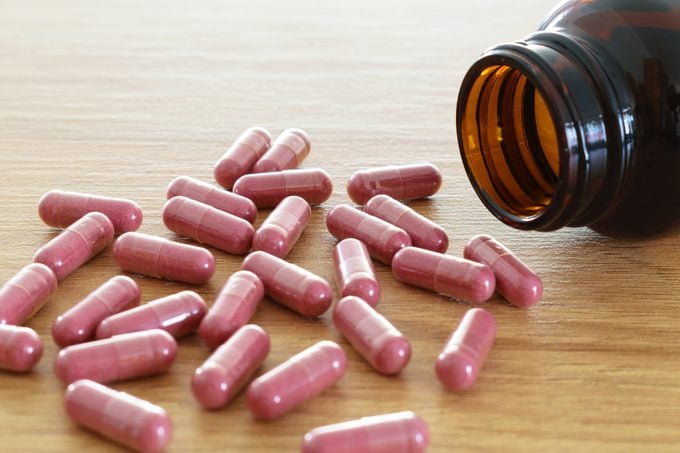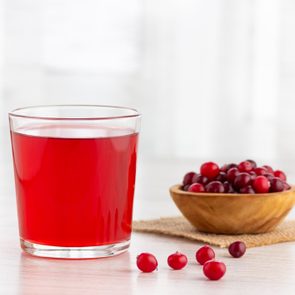Should You Take Cranberry Pills for UTI?
Updated: Mar. 22, 2021
Cranberry juice is touted for its believed benefits for urinary tract infections. So, can cranberry pills help? Here's what you need to know.
UTIs and cranberries
The thought of going through another bout of burning when you pee, peeing a lot, and the exceptionally terrible-smelling urine is jarring. But that’s the reality some women experience with urinary tract infections. If UTIs are a regular occurrence for you, you might benefit from this seasonal fruit: cranberries. You may even drink cranberry juice to help with a UTI.
Here’s what you need to know about UTIs, cranberries—specifically, cranberry pills for UTI—and the potential benefits and risks.
What is a UTI?
Your urinary tract is made up of several parts, including the kidneys, bladder, and urethra. Symptoms of a UTI include burning when you urinate, the urgency to urinate, and foul-smelling, cloudy urine. You may also notice fever, lower abdominal pressure, or back pain. While both men and women can develop a UTI, four times as many women are diagnosed with these infections.
How does cranberry help a UTI?
Chemical compounds in cranberries called proanthocyanins and a sugar called D-mannose are likely the key ingredients that may help with UTIs. E. coli bacteria is one of the most common UTI causes.
Research suggests that these compounds keep E. coli cells from adhering to the lining of the urinary tract, so bacteria can’t grow, suggests a 2018 study in BMC Urology.
Some people take cranberry supplements, available as tablets, capsules, or powder, to prevent or try to treat a UTI.
“Cranberry supplements make certain types of E. coli bacteria less able to stick to the lining of the urinary tract, which allows you to clear the bacteria more readily,” says Michael Lutz, MD, a urologist with Beaumont Health in West Bloomfield, Michigan. According to a 2018 review in Current Pharmaceutical Biotechnology, cranberry supplements may help prevent UTIs in women and may act as an anti-inflammatory to decrease the severity of symptoms if they’re prone to UTIs. (Don’t miss the other cranberry health benefits.)

Do cranberry pills prevent a UTI?
If you are someone who has recurrent UTIs (defined as two or more infections within six months), then taking cranberry products might cut your risk of developing another infection by one-third, according to the National Center for Complementary and Integrative Health (NCCIH). Still, more high-quality research needs to be done to understand who might benefit from taking cranberry, the agency says. The U.S. Food and Drug Administration allows cranberry supplement manufacturers to claim that cranberry can have this benefit in women who have a history of recurrent UTIs.
Do cranberry pills treat a UTI?
While the NCCIH notes that cranberry has not been shown to be an effective UTI home remedy, it may help in certain instances, says Dr. Lutz.
For women who get these recurrent UTIs, he says that “super-hydrating” and taking cranberry pills may increase the chance of flushing out the infection rather than having to take another round of antibiotics. That means drinking more than two liters of water, he says. However, pay attention to your symptoms. If your infection progresses and you experience fever, chills, or back pain, an antibiotic will be necessary. Call your doctor.
The benefits and risks of cranberry pills
You might prefer to take a cranberry supplement, especially if you’re looking to avoid the carbohydrates in the juice, says Dr. Lutz. An 8-ounce glass of cranberry juice has 30 grams of carbohydrates. One 2015 study in Phytotherapy Research looked at 182 women who had recurrent UTIs. Just 11 percent of women who took 500 mg of cranberry for six months developed UTIs compared to 26 percent in the placebo group.
That said, some past research suggests that both cranberry juice and cranberry supplements are similarly effective in managing recurring UTIs, according to a 2018 review in Nature Reviews Urology.
“Because studies use a variety of doses of both juice and supplements or extracts, it’s hard to know exactly which is right for you,” says Seattle-based functional nutrition expert, Ginger Hultin, RD, spokesperson for the Academy of Nutrition and Dietetics and owner of Champagne Nutrition.
“Many health care providers and registered dietitians take a ‘food first’ approach, and so taking a less concentrated source to start, such as drinking cranberry juice, may be a good place to start,” she says. If you opt for cranberry juice over supplements, choose a brand that is 100 percent cranberry juice, not “cranberry cocktail,” she says. (Learn more about cranberry benefits.)
Choosing the right supplement
Supplements, even if they come from a fruit, run the risk of interacting with existing medications and supplements you’re taking, which is another reason to talk to your doctor before starting, says Hultin. High intakes of cranberry might also cause digestive upset, she adds.
It’s easy to find a cranberry supplement either at your local pharmacy, the supplement aisle at your grocery store, or online.
However, “the quality really matters when you take supplements, and you should buy from a trustworthy brand,” says Robin Foroutan, RDN, who specializes in integrative and functional nutrition in New York City and spokesperson for the Academy of Nutrition and Dietetics. She advises checking with a health care provider who is knowledgeable about supplements. A good place to start is your primary care provider.
Next, here are the vitamins and supplements doctors take every day.




















